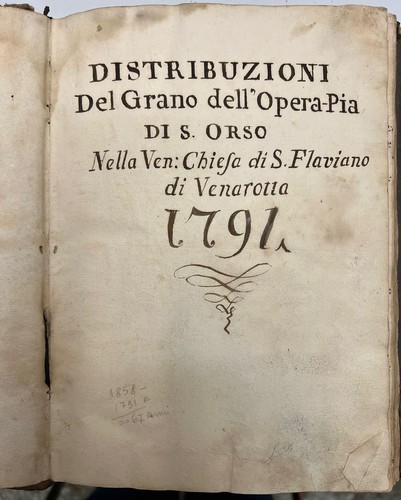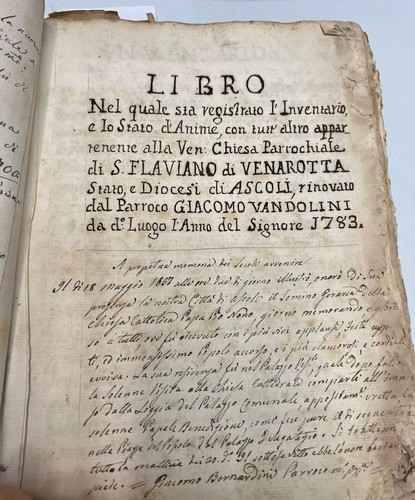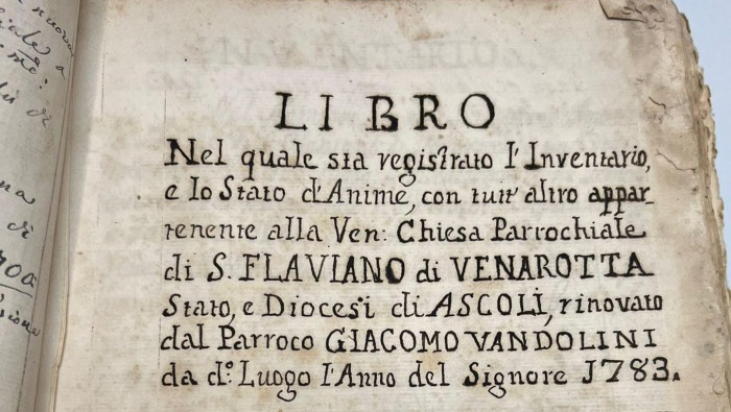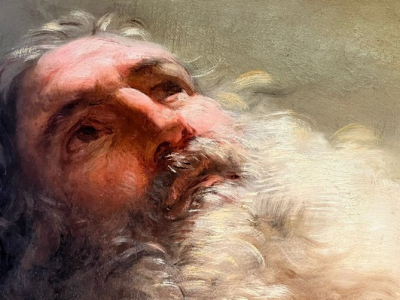stdClass Object
(
[id] => 19947
[title] => Let's rediscover the Frumentari Mountains the origin of the solidarity economy
[alias] => let-s-rediscover-the-frumentari-mountains-the-origin-of-the-solidarity-economy
[introtext] => The proposal - A collective project on the first microcredit realities, born in the 15th century through the initiative of the Franciscans
by Luigino Bruni
published in Avvenire on 11/01/2024
The idea of a widespread search in parish, diocesan, religious order and confraternity archives is born, to create from below a map of these forgotten institutions
The year 2025 is an important year for the Italian solidarity and civic economy. It is six hundred years since the birth of Blessed Mark of Montegallo, a tireless Franciscan and founder of Monti di Pietà, and three hundred and fifty since that of Scipione Maffei of Verona, who in his Dell'impiego del denaro (1744) demonstrated the ethical and Christian legitimacy of lending at (modest) interest. In full preparation for these “financial” anniversaries, I arrived at Christmas in my hometown-now Roccafluvione (AP), Marsia before the unification of Italy. And I did some research in the parish archives, moved by the hope of finding an ancient presence of a Monte frumentario, although no old man in the village remembers any in the area. No trace on the web or in books. So I was not expecting anything. Instead, I found a real mine.
[fulltext] =>
 Not only did my parish have a Monte frumentario of which no less than two registers have been preserved, but with the help of a young colleague, Antonio Ferretti, and some parish priests, I tracked down other registers of Monti frumentari in two very nearby parishes: Capodipiano (Monte di S. Orso) and Roccacasaregnano. And then, thanks to historian Giuseppe Gagliardi, I learned of a record of a pastoral visit by Bishop Zelli in 1833-1837, where at least 70 Monti frumentari are listed in the diocese of Ascoli Piceno alone, of which as many as eight are in the mountain parishes of my municipality. A much more capillary and extensive presence, then, than we previously thought, a true microcredit network that lasted for centuries. We have already talked about the Frumentari Mountains in Avvenire. With deputy director Marco Ferrando and Federcasse (Bcc) we have also produced a podcast series “La terra del noi”. These Mounts were founded by the Franciscans in the late 15th century, later spread by the Capuchins and revived in the 18th century by the pastoral action of Pope Orsini (Benedict XIII). The Franciscans had first founded “pawnshops” in the cities of central and northern Italy, Christian variants of the Jewish and earlier Roman pawnshops. But in the countryside and in the South, where currency was scarce and therefore often usurious, those same Franciscans had the ingenious idea of starting “grain mounds,” small banks where grain was lent in the fall for seed and repaid after the harvest - taken “a satin” and repaid “a ridge”: the difference was the interest. The idea was as simple as it was wonderful: if the currency is not there or is too expensive, one can try to turn grain into currency (“grana”). They skipped a financial passage and created a great civil and Christian passage on which many climbed and were saved. The Frumentari Mountains are important because they are a perfect icon of the vocation of our now forgotten economy. While, in fact, the Protestant world separated market from gift - business is business and gift is gift - and thus invented philanthropic capitalism, the Catholic world mixed market and gift, gratuitousness and contracts, solidarity and interest. The Mount, in fact, did not give grain: it lent it (at interest); but that loan had the same substance and fragrance as agape, because it allowed those who had no seed to sow and then have bread. And so they explained what credit means: belief, trust, fides, life, and that communities do not live without credit, without believing in one another.
Not only did my parish have a Monte frumentario of which no less than two registers have been preserved, but with the help of a young colleague, Antonio Ferretti, and some parish priests, I tracked down other registers of Monti frumentari in two very nearby parishes: Capodipiano (Monte di S. Orso) and Roccacasaregnano. And then, thanks to historian Giuseppe Gagliardi, I learned of a record of a pastoral visit by Bishop Zelli in 1833-1837, where at least 70 Monti frumentari are listed in the diocese of Ascoli Piceno alone, of which as many as eight are in the mountain parishes of my municipality. A much more capillary and extensive presence, then, than we previously thought, a true microcredit network that lasted for centuries. We have already talked about the Frumentari Mountains in Avvenire. With deputy director Marco Ferrando and Federcasse (Bcc) we have also produced a podcast series “La terra del noi”. These Mounts were founded by the Franciscans in the late 15th century, later spread by the Capuchins and revived in the 18th century by the pastoral action of Pope Orsini (Benedict XIII). The Franciscans had first founded “pawnshops” in the cities of central and northern Italy, Christian variants of the Jewish and earlier Roman pawnshops. But in the countryside and in the South, where currency was scarce and therefore often usurious, those same Franciscans had the ingenious idea of starting “grain mounds,” small banks where grain was lent in the fall for seed and repaid after the harvest - taken “a satin” and repaid “a ridge”: the difference was the interest. The idea was as simple as it was wonderful: if the currency is not there or is too expensive, one can try to turn grain into currency (“grana”). They skipped a financial passage and created a great civil and Christian passage on which many climbed and were saved. The Frumentari Mountains are important because they are a perfect icon of the vocation of our now forgotten economy. While, in fact, the Protestant world separated market from gift - business is business and gift is gift - and thus invented philanthropic capitalism, the Catholic world mixed market and gift, gratuitousness and contracts, solidarity and interest. The Mount, in fact, did not give grain: it lent it (at interest); but that loan had the same substance and fragrance as agape, because it allowed those who had no seed to sow and then have bread. And so they explained what credit means: belief, trust, fides, life, and that communities do not live without credit, without believing in one another.
All this also emerges from the two old registers of the Mount that we found, dusty, forgotten and beautiful in the small, cold parish archives in Marsia, where they had been lying since the 1930s when they were found and rescued by then-parish priest Giuseppe Ciabattoni. The first, oldest, bears “year 1768” written on its cover; the other is for the years 1826 and following. One sheet, dated Nov. 17, 1764, reads thus, “ The grain of the Monte Frumentario of the Holy Relics of this Provostal Church of St. Stephen was dispensed to all those marked in the present book in the order that follows from the Mayors Domenico Martini and Giovanni Ruzzi da Casacagnano to be collected in the month of August of the future year 1765 by the new mayors Pietro Martini and Antonio Cesarini.” The Mount was called “frumentario” as early as the 1700s, was managed by a Confraternity (of the Holy Relics), and administered, according to an ancient Church tradition, by two mayors (“sindici”), who held office for only one year. From the book we note, in fact, that the mayors who distributed the grain in November were not the ones who administered the returns in the following summer-ancient institutional wisdom! In the sheet for the year 1765 thus, in fact, we read, “ The grain noted in the present book was not exact [past participle of exact] because of the very scarce harvest that occurred in the year 1765 in which it had to be exacted from the Mayors Pietro Martini da Marscia [dialectal name of Marsia] and Antonio Cesarini da Casacagnano.Signed F. Fratini, Provost. There, October 3, 1765.” There was no profiteering on misfortune, no making the poor despair - this is also root.
 Then follow the accounting records, numbered in ascending order by date (1,2,3...). The coins were the paoli, baiocchi and scudi. The unit of volume was the quarta, but also the rubbio and the prebenda - in the mid-nineteenth century in several towns in the Ascoli region the rubbio was divided into 8 quarts, the quarta into 4 prebenda. Interesting, then, to note that the balance of the debt could be in grain, but also in coinage or days of labor. In fact we read in the second book, dated April 10, 1826: “ Giovanni, son of Vincenza da Gualdo, since he had quarta una of gold wheat at the price of paoli ten and a half, on account he worked one day, then a second day, and more discounted days six, and more days two, and more days four, and more residue of a prebend of Turkish wheat paoli two, and more had quarta una of wheat at the price of paoli fifteen” . So that of Marsyas was a hybrid Mount: a bit frumentary (grain with wheat), a bit pecuniary (payments of the grain in coin) and also labor-this is also Article 1 of the Constitution. The scripture was then crossed out by the mayors for payment. The records of the Mount of Marsyas, and those of neighboring parishes, all stop in the late 1850s, on the eve of the arrival of the Piedmontese when these church institutions were suppressed - a chapter all to be explored.
Then follow the accounting records, numbered in ascending order by date (1,2,3...). The coins were the paoli, baiocchi and scudi. The unit of volume was the quarta, but also the rubbio and the prebenda - in the mid-nineteenth century in several towns in the Ascoli region the rubbio was divided into 8 quarts, the quarta into 4 prebenda. Interesting, then, to note that the balance of the debt could be in grain, but also in coinage or days of labor. In fact we read in the second book, dated April 10, 1826: “ Giovanni, son of Vincenza da Gualdo, since he had quarta una of gold wheat at the price of paoli ten and a half, on account he worked one day, then a second day, and more discounted days six, and more days two, and more days four, and more residue of a prebend of Turkish wheat paoli two, and more had quarta una of wheat at the price of paoli fifteen” . So that of Marsyas was a hybrid Mount: a bit frumentary (grain with wheat), a bit pecuniary (payments of the grain in coin) and also labor-this is also Article 1 of the Constitution. The scripture was then crossed out by the mayors for payment. The records of the Mount of Marsyas, and those of neighboring parishes, all stop in the late 1850s, on the eve of the arrival of the Piedmontese when these church institutions were suppressed - a chapter all to be explored.
Out of this beautiful experience of mine came a proposal, addressed primarily to you readers of Avvenire: To give life to a widespread research on the Monti frumentari, in an exercise of collective intelligence. Let us search parish, diocesan, confraternity and religious order archives for a bottom-up mapping of these forgotten institutions. Let us create a “patrimonial community,” which reappropriates a piece of its own cultural capital. You don't need to be a specialist or a historian; anyone who lives in mountain and country towns, especially in the Center, South and Islands (but almost all regions had Mountains) can do their part. Let's look for traces of the Frumentari Mountains, but also of the “Monti delle doti” (or Virgin Mountains), of chestnuts, of wool, and who knows how many others. Don Giuseppe de Luca, in the 1950s had the great intuition of an “Italian Archive for the History of Piety.” There is also a history of economic and financial piety waiting to be discovered, known, valued. The roots are not past: they are present and future. And what is the “grain” of today, the seed to be guarded and shared for living? The year 2025 is a jubilee year: biblical jubilees were also and above all matters of the poor, of debts and credits. You can write your findings, big and small, to my address: l.bruni@lumsa.it. We will present the first results at some conferences, starting March 19, in Ascoli, for the anniversary of Blessed Mark of Montegallo, and from time to time we will say on these pages. Happy Jubilee and good research to all and sundry.
An initiative with “Avvenire” 600 years after the birth of Blessed Marco da Montegallo, the friar who started the experiment that gave rise to the loan of grain at modest interest rates for farmers in difficulty, and 350 years after that of Scipione Maffei, who demonstrated the Christian legitimacy of the mixture of solidarity and market
[checked_out] => 0
[checked_out_time] => 0000-00-00 00:00:00
[catid] => 888
[created] => 2025-01-11 18:47:35
[created_by] => 64
[created_by_alias] => Luigino Bruni
[state] => 1
[modified] => 2025-02-13 14:57:00
[modified_by] => 64
[modified_by_name] => Antonella Ferrucci
[publish_up] => 2025-01-11 18:53:56
[publish_down] => 0000-00-00 00:00:00
[images] => {"image_intro":"","float_intro":"","image_intro_alt":"","image_intro_caption":"","image_fulltext":"","float_fulltext":"","image_fulltext_alt":"","image_fulltext_caption":""}
[urls] => {"urla":false,"urlatext":"","targeta":"","urlb":false,"urlbtext":"","targetb":"","urlc":false,"urlctext":"","targetc":""}
[attribs] => {"article_layout":"","show_title":"","link_titles":"","show_tags":"","show_intro":"","info_block_position":"","info_block_show_title":"","show_category":"","link_category":"","show_parent_category":"","link_parent_category":"","show_associations":"","show_author":"","link_author":"","show_create_date":"","show_modify_date":"","show_publish_date":"","show_item_navigation":"","show_icons":"","show_print_icon":"","show_email_icon":"","show_vote":"","show_hits":"","show_noauth":"","urls_position":"","alternative_readmore":"","article_page_title":"","show_publishing_options":"","show_article_options":"","show_urls_images_backend":"","show_urls_images_frontend":"","helix_ultimate_image":"images\/2025\/02\/13\/Monte_Frumentario_Venarotta_crop_ant.jpg","helix_ultimate_image_alt_txt":"","spfeatured_image":"images\/2025\/01\/11\/Monte_Frumentario_Venarotta_crop_ant.jpg","helix_ultimate_article_format":"standard","helix_ultimate_audio":"","helix_ultimate_gallery":"","helix_ultimate_video":"","video":""}
[metadata] => {"robots":"","author":"","rights":"","xreference":""}
[metakey] =>
[metadesc] =>
[access] => 1
[hits] => 1002
[xreference] =>
[featured] => 1
[language] => en-GB
[on_img_default] => 0
[readmore] => 8359
[ordering] => 0
[category_title] => EN - Avvenire Editorials
[category_route] => economia-civile/it-editoriali-vari/it-varie-editoriali-avvenire
[category_access] => 1
[category_alias] => en-avvenire-editorial
[published] => 1
[parents_published] => 1
[lft] => 79
[author] => Luigino Bruni
[author_email] => ferrucci.anto@gmail.com
[parent_title] => IT - Editoriali vari
[parent_id] => 893
[parent_route] => economia-civile/it-editoriali-vari
[parent_alias] => it-editoriali-vari
[rating] => 0
[rating_count] => 0
[alternative_readmore] =>
[layout] =>
[params] => Joomla\Registry\Registry Object
(
[data:protected] => stdClass Object
(
[article_layout] => _:default
[show_title] => 1
[link_titles] => 1
[show_intro] => 1
[info_block_position] => 0
[info_block_show_title] => 1
[show_category] => 1
[link_category] => 1
[show_parent_category] => 1
[link_parent_category] => 1
[show_associations] => 0
[flags] => 1
[show_author] => 0
[link_author] => 0
[show_create_date] => 1
[show_modify_date] => 0
[show_publish_date] => 1
[show_item_navigation] => 1
[show_vote] => 0
[show_readmore] => 0
[show_readmore_title] => 0
[readmore_limit] => 100
[show_tags] => 1
[show_icons] => 1
[show_print_icon] => 1
[show_email_icon] => 1
[show_hits] => 0
[record_hits] => 1
[show_noauth] => 0
[urls_position] => 1
[captcha] =>
[show_publishing_options] => 1
[show_article_options] => 1
[save_history] => 1
[history_limit] => 10
[show_urls_images_frontend] => 0
[show_urls_images_backend] => 1
[targeta] => 0
[targetb] => 0
[targetc] => 0
[float_intro] => left
[float_fulltext] => left
[category_layout] => _:blog
[show_category_heading_title_text] => 0
[show_category_title] => 0
[show_description] => 0
[show_description_image] => 0
[maxLevel] => 0
[show_empty_categories] => 0
[show_no_articles] => 1
[show_subcat_desc] => 0
[show_cat_num_articles] => 0
[show_cat_tags] => 1
[show_base_description] => 1
[maxLevelcat] => -1
[show_empty_categories_cat] => 0
[show_subcat_desc_cat] => 0
[show_cat_num_articles_cat] => 0
[num_leading_articles] => 0
[num_intro_articles] => 14
[num_columns] => 2
[num_links] => 0
[multi_column_order] => 1
[show_subcategory_content] => -1
[show_pagination_limit] => 1
[filter_field] => hide
[show_headings] => 1
[list_show_date] => 0
[date_format] =>
[list_show_hits] => 1
[list_show_author] => 1
[list_show_votes] => 0
[list_show_ratings] => 0
[orderby_pri] => none
[orderby_sec] => rdate
[order_date] => published
[show_pagination] => 2
[show_pagination_results] => 1
[show_featured] => show
[show_feed_link] => 1
[feed_summary] => 0
[feed_show_readmore] => 0
[sef_advanced] => 1
[sef_ids] => 1
[custom_fields_enable] => 1
[show_page_heading] => 0
[layout_type] => blog
[menu_text] => 1
[menu_show] => 1
[secure] => 0
[helixultimatemenulayout] => {"width":600,"menualign":"right","megamenu":0,"showtitle":1,"faicon":"","customclass":"","dropdown":"right","badge":"","badge_position":"","badge_bg_color":"","badge_text_color":"","layout":[]}
[helixultimate_enable_page_title] => 1
[helixultimate_page_title_alt] => Avvenire Editorials
[helixultimate_page_subtitle] => Civil Economy
[helixultimate_page_title_heading] => h2
[page_title] => Avvenire Editorials
[page_description] =>
[page_rights] =>
[robots] =>
[access-view] => 1
)
[initialized:protected] => 1
[separator] => .
)
[displayDate] => 2025-01-11 18:47:35
[tags] => Joomla\CMS\Helper\TagsHelper Object
(
[tagsChanged:protected] =>
[replaceTags:protected] =>
[typeAlias] =>
[itemTags] => Array
(
[0] => stdClass Object
(
[tag_id] => 215
[id] => 215
[parent_id] => 1
[lft] => 427
[rgt] => 428
[level] => 1
[path] => monti-frumentari
[title] => Monti Frumentari
[alias] => monti-frumentari
[note] =>
[description] =>
[published] => 1
[checked_out] => 0
[checked_out_time] => 0000-00-00 00:00:00
[access] => 1
[params] => {}
[metadesc] =>
[metakey] =>
[metadata] => {}
[created_user_id] => 64
[created_time] => 2025-01-11 18:47:35
[created_by_alias] =>
[modified_user_id] => 0
[modified_time] => 2025-01-12 20:50:24
[images] => {}
[urls] => {}
[hits] => 2582
[language] => *
[version] => 1
[publish_up] => 2025-01-11 18:47:35
[publish_down] => 2025-01-11 18:47:35
)
)
)
[slug] => 19947:let-s-rediscover-the-frumentari-mountains-the-origin-of-the-solidarity-economy
[parent_slug] => 893:it-editoriali-vari
[catslug] => 888:en-avvenire-editorial
[event] => stdClass Object
(
[afterDisplayTitle] =>
[beforeDisplayContent] =>
[afterDisplayContent] =>
)
[text] => The proposal - A collective project on the first microcredit realities, born in the 15th century through the initiative of the Franciscans
by Luigino Bruni
published in Avvenire on 11/01/2024
The idea of a widespread search in parish, diocesan, religious order and confraternity archives is born, to create from below a map of these forgotten institutions
The year 2025 is an important year for the Italian solidarity and civic economy. It is six hundred years since the birth of Blessed Mark of Montegallo, a tireless Franciscan and founder of Monti di Pietà, and three hundred and fifty since that of Scipione Maffei of Verona, who in his Dell'impiego del denaro (1744) demonstrated the ethical and Christian legitimacy of lending at (modest) interest. In full preparation for these “financial” anniversaries, I arrived at Christmas in my hometown-now Roccafluvione (AP), Marsia before the unification of Italy. And I did some research in the parish archives, moved by the hope of finding an ancient presence of a Monte frumentario, although no old man in the village remembers any in the area. No trace on the web or in books. So I was not expecting anything. Instead, I found a real mine.
[jcfields] => Array
(
)
[type] => intro
[oddeven] => item-odd
)














 If anyone still has any doubt that our capitalism has become something very similar to a religion, they just have to take a good look around on the web and the big shopping malls today and then try to figure out what's really going on. In the places where Black Friday is celebrated what is happening is something very similar to a religious phenomenon, with many traits in common with the functions of traditional religions.
If anyone still has any doubt that our capitalism has become something very similar to a religion, they just have to take a good look around on the web and the big shopping malls today and then try to figure out what's really going on. In the places where Black Friday is celebrated what is happening is something very similar to a religious phenomenon, with many traits in common with the functions of traditional religions. Economy is a word of ancient Greek origins that refers directly to the house (oikosnomos, rules for managing the house), therefore to the family. Yet modern economy – and its contemporary version even more so – has been thought of as an area governed by different principles, distinct and in many ways opposed to the principles and values that have always held up and continue to hold up the family. A founding principle of the family, perhaps the first and the one underlying the others, is that of gratuitousness, which is the furthest away from capitalist economy that only knows surrogates of gratuitousness (discounts, philanthropy, sales) that play the role of immunizing the markets from real gratuitousness.
Economy is a word of ancient Greek origins that refers directly to the house (oikosnomos, rules for managing the house), therefore to the family. Yet modern economy – and its contemporary version even more so – has been thought of as an area governed by different principles, distinct and in many ways opposed to the principles and values that have always held up and continue to hold up the family. A founding principle of the family, perhaps the first and the one underlying the others, is that of gratuitousness, which is the furthest away from capitalist economy that only knows surrogates of gratuitousness (discounts, philanthropy, sales) that play the role of immunizing the markets from real gratuitousness. The culture of contracts is the big winner of our time of too many poor on the losers' side. It grew from the ashes of the culture of pacts, which had been the backbone of the family, civil and political edifice of the past generations. Until a few decades ago, the reign of the contract was important but delimited, because much of people's life was ruled by the register of pacts (family, friendship, politics, religion, work...).
The culture of contracts is the big winner of our time of too many poor on the losers' side. It grew from the ashes of the culture of pacts, which had been the backbone of the family, civil and political edifice of the past generations. Until a few decades ago, the reign of the contract was important but delimited, because much of people's life was ruled by the register of pacts (family, friendship, politics, religion, work...).